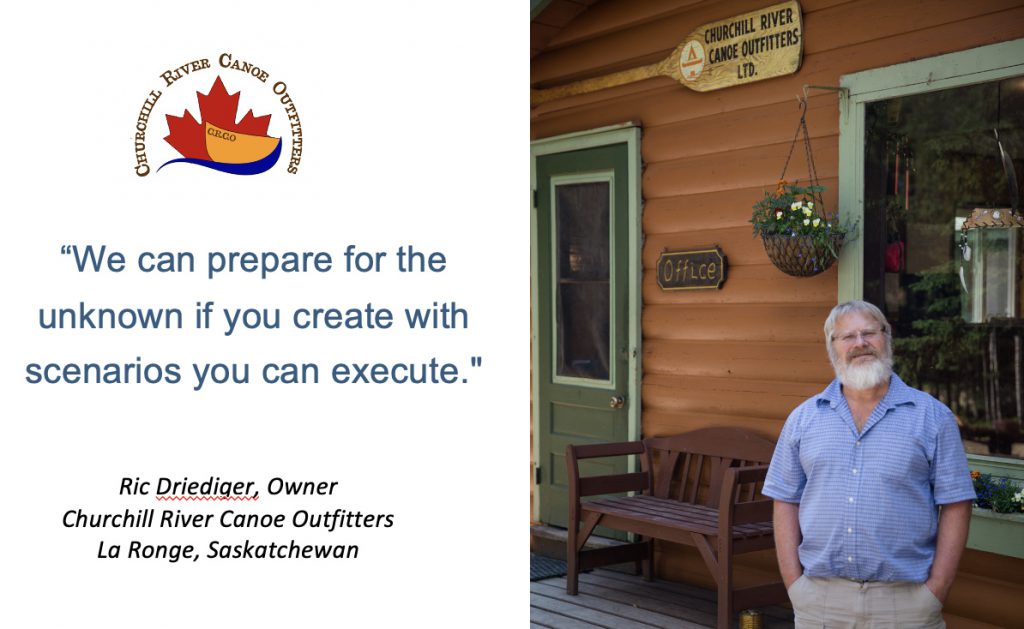As the tourism industry continues to recover from the pandemic, cultivating new and repeat customers is a daunting challenge with short, mid, and long-term implications. At the root of any sale is having a product, service or experience that delivers benefits that people are seeking.
Take time to consider the answer to one fundamental question
“What new customer needs can our business address?”
Across Canada and in the Central Counties Tourism (CCT) region, tourism businesses are tackling pandemic survival in servicing the local market while strategically positioning their investments for the long term. From technology supports to product modifications, creative marketing and new sales channels, entrepreneurs have broadened the lens in finding innovative solutions to sustain and grow their businesses.
Despite the pandemic, businesses joined together to introduce new projects that highlighted “shop local” and outdoor themes, reinforcing the power and support of communities. This summer saw the launch of the Main Street Unionville Market and the Grown in Georgina series of markets and tours which brought local farmers, artisans and new customers into the community. York Farm Fresh launched a multilingual app, making multiple passport trails accessible in other languages. To provide safe family-friendly experiences and develop a local tourism asset, the Township of Uxbridge developed the Lucy Maud Montgomery Trail, a self-guided podcast to support the Anne and Maud Experience. The Brock Board of Trade also collaborated with businesses to create a cool experience for families to enjoy this summer.
In Comox, BC 40 Knots Winery joined the ranks in quickly adding curbside pick-up and modifying their venue as per the provincial regulations, but they wanted to do more to secure their future. They invested in technology tools to identify and learn about their best customers and uncover insights.
Step 1: New reservation system
- Tock reservations technology-enabled scheduling of on-site visits, pick-ups and deliveries and integrated with their social media channels allowing for enhanced promotional opportunities
Step 2: Customer Research
- Analyzed the historical spending of the customers in their Wine Direct e-commerce platform to determine the lifetime value of their current customers
- Downloaded the free app FocusGroupIt to host online focus-groups with potential customers to test ideas for the local and regional market to better understand their needs and desires the vineyard could serve
Step 3: Identified and phased in new products
- Design new experiences for millennials, book lovers, and cheese aficionados, all centred around their core product – wine
- Introduced a class pass to create an incentive to pre-purchase four workshops to receive a discount and secure future business
- Continued to advance their capital investment in an outdoor patio with moveable full-length windows to create a four-season outdoor hosting area with flexible space configuration.
The benefits of geofencing are undeniable and Central Counties has embraced this mobile phone technology that creates invisible “fences” around a target area that captures everyone who enters the targeted area and records their phone’s common evening location as their home location, identifying their visitor segment, distance from the target area, and profiles.
The Grand Prairie Tourism Association invested in geofencing, using a geographic perimeter around their northern Alberta region, to send targeted messages to individual devices with specific marketing offers. They realized early in the pandemic the reasons people were coming to their community were not tourism-related. Grande Prairie Tourism wanted to tap into these visitor markets and ensure locals knew which businesses had visitor opportunities for them to enjoy. This led to a strong foundation for partnerships and a new approach to planning itineraries with hotels and attractions in the region.
In La Ronge, Saskatchewan, Churchill Rivers Canoe Outfitters discovered early in the pandemic to not underestimate the local market’s willingness to try different things. It required, as owner Ric Driediger stated, “a mental shift on our part, letting go of old assumptions and ways of doing business.” They disaggregated their core paddling experience, re-imagined the arrivals experience from a visitor’s lens, and offered it to a new, domestic market at a lower price point. This change generated a new client base which was more profitable per guest.
discovered early in the pandemic to not underestimate the local market’s willingness to try different things. It required, as owner Ric Driediger stated, “a mental shift on our part, letting go of old assumptions and ways of doing business.” They disaggregated their core paddling experience, re-imagined the arrivals experience from a visitor’s lens, and offered it to a new, domestic market at a lower price point. This change generated a new client base which was more profitable per guest.
Elmhirst’s Resort in Keene, Ontario, tackled this challenge with a multi-pronged approach. They:
- Listed their property on Harvest Hosts, a membership organization catering to RV campers looking for unique places to overnight. Wineries, breweries, and farms have tapped into this channel, and while Elmhirst’s core business is to sell accommodation, they also had space on their property to welcome two RVs. These guests, in turn purchased meals, amenities, and services at the resort. Early indicators suggest these travellers would consider returning to stay at the resort.
- Tapped into the emotions of past customers to reconnect and share family memories at their resort. They launched a successful social media campaign, “My favourite adventure memory of Elmhirst’s Resort is …”and asked customers to fill in the blank. Not only did this reengage previous guests with the resort, it showed new customers why they might enjoy visiting the resort. Most importantly, it delivered new bookings.
- Leveraged the desire for people to be out in nature, with people in their bubble, to launch an Escape Maze targeted to day guests and an opportunity to learn about the history of Rice Lake. It attracted the local market while providing a new permanent activity for their guests and generated new revenue.
- Searched to find a new, underserved market that would enjoy what Elmirst’s has to offer. This led to targeting new Canadian families living in multi-generational households, wanting to rent cabins where they could cook their own food, gather, and socialize.
Finally, in Norris Point, NL tourism operators Ian and Rebecca Stone, of Tour Gros Morne and Taste of Gros Morne created a group of business in their community that were willing to forge partnerships, share risks and working together to ensure they all generated business during the pandemic. This ‘coalition of the willing’ worked to align products, services and build consumer trust so when travellers purchased from anyone in the coalition; they would have increased confidence in the products, services, and delivery partners.
By Nancy Arsenault, Managing Partner, Tourism Café Canada Ltd.



